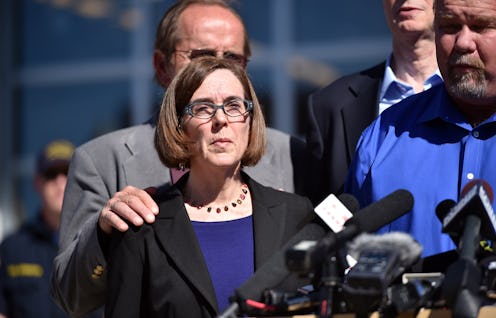News
Oregon Gov. Kate Brown Is 2016's Silver Lining
At least one woman made history on Nov. 8. Of course, that woman wasn't Hillary Clinton, who acknowledged in her concession speech that women have "yet to break that highest, hardest glass ceiling." But Oregon voters made history when they elected Kate Brown as governor — marking the first time Americans have voted to put an openly LGBT person in charge of a U.S. state. So while misogyny, racism, and bigotry may have won on the national stage, there's cause for progressive celebration in the Pacific Northwest.
Brown won her election with 50.4 percent of the vote, compared to her opponent, Bud Pierce, who took 44 percent of the vote, according to The Oregonian. The 56-year-old Democrat is openly bisexual, (she was outed in the 1990s) and has been married to her husband since 1997. She has spoken openly about not only her identification with the LGBT community, but also as a survivor of domestic violence who intimately understands the pain caused by the misogyny that ran rampant during this campaign.
For the record, Brown is not the first out LGBT person to serve as governor — former New Jersey Gov. Jim McGreevy came out as gay in 2004, but he did so amid swirling scandals that saw him resign shortly thereafter. But because Brown initially came to the governor's office through a vacancy (more on that later), Oregonians had not yet had the chance to vote for her directly.
Voters made their choice clear on Tuesday. During her her acceptance speech, Brown thanked Oregonians for voting — even if they didn't cast a ballot for her. She was introduced by former Gov. Barbara Roberts, the first woman ever to serve as Oregon's head of state.
"No matter how you voted, thank you for making your voices heard, thank you for caring about the future of your state and thank you for your support," Brown said to an enthusiastic crowd. Her speech touched on the divisive nature of this election season, and, like many of Election Night's victors, she called for unity.
"I believe that the times call upon us to take action, and I believe that if we work together we can shape both the place and the times in which we live," she said. "Let's work together to make Oregon, our home, a place where everyone can thrive."
Brown's journey to this historical milestone has been a somewhat unconventional one. After more than two decades in public service, she was elected in 2014 as Oregon's Secretary of State, but then assumed the governor's office after Gov. John Kitzhaber resigned in February 2015 amid numerous scandals. Oregon does not have a lieutenant governor, which meant she was next in the line of succession. Reports at the time said she was notified of her promotion just five days before she took office.
By winning her election on Nov. 8, Brown gained the explicit approval of her constituents, as well as her handling of several recent scandals and tragedies that have befallen the Beaver State, including the mass shooting at Umpqua Community College, an oil spill caused by a train derailment, and, of course, her predecessor's resignation.
But throughout it all, Brown has remained a calm, compassionate voice of reason. She has, on several occasions, spoken candidly about the importance of being visible as a person in power who is also a member of marginalized groups.
Just three months after taking office, Brown signed a bill that outlawed so-called conversion therapy on minors in the state. The discredited, unscientific practice (endorsed by the vice president-elect) aims to change a person's sexual orientation or gender identity through the use of prayer, aversion therapy, and frequently employs physical and verbal abuse and shame tactics. The practice, sometimes called “ex-gay” or “reparative” therapy, has been denounced as ineffective and harmful by every major mental health organization in the nation, and by President Obama and other top federal officials.
During her gubernatorial campaign, Brown told the Washington, D.C.-based LGBT outlet The Washington Blade that she hopes her victory will help empower others.
“You can’t be what you can’t see,” she told the paper in an interview published Oct. 19. “If I can be a role model for one young person that decides that their life is worth living because there’s someone like them in the world, it’s worth it."
Those words may well be a salve to wounded souls still stunned over Hillary Clinton's defeat. Brown campaigned with and for Clinton, and ultimately, Oregon's seven electoral votes did go to the former First Lady. So while Election Day turned into a dark night for countless Americans hoping to step away from our long history of sexism, at least there's one state in the union where young girls (and LGBT youth alike) can look to their leaders and see a reflection of themselves.
